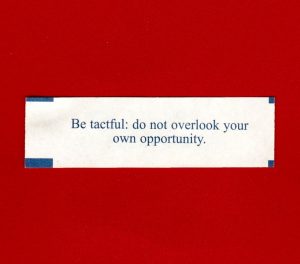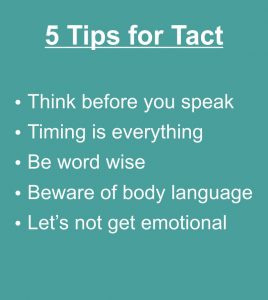Fortune Cookie Friday: Tips for Tact
We live in a society of heavy politically correct policing. It’s hard to say anything without offending someone. Sometimes even the most benign phrase can trigger a person. I have personally offended someone by saying, “Bless you,” after they sneezed. Either the person was an atheist, they thought I said something else, or they were just having an incredibly bad day. Either way, the look I received was not one of gratitude.

We all have to learn what to say or how to act so we don’t hurt someone’s feelings. When you see someone looking upset, you don’t use a snarky tone and say, “What’s your problem?” You approach them and kindly ask, “Is there something wrong? Can I help?”
Learning to be tactful can take a lot of practice, but it can be very useful when dealing with difficult or delicate situations. Simply being polite can make all the difference in the world.
What Is Tact?
Tact is the ability to tell the truth so that other people’s feelings aren’t hurt. Tact allows you to give difficult feedback or discuss sensitive information while preserving a relationship.
Winston S. Churchill described tact as, “the ability to tell someone to go to hell in such a way that they look forward to the trip.” Now that is some impressive communication skills.
5 Tips for Tactfulness
1. Think Before You Speak
Before you say anything, stop and think. Ask yourself, how you would feel if you were in their shoes. This empathy will help you in formulating an appropriate response.
You also need to use active listening when someone is talking to you. This means that you actually have to pay attention to what they are saying, not looking over their shoulder, deciding what you should eat for lunch. Don’t let “Mwah mwah mwaah mwah.” prevent you from being tactful.
2. Timing Is Everything
You may have heard the phrase, “No time like the present.” Well, sometimes waiting for a more appropriate moment can make a conversation go smoothly.
Imagine you have to tell someone something that might be embarrassing or critical. You shouldn’t say it in a crowd of strangers. It’s better to wait, or pull them casually aside and break the news.
 3. Be Word Wise
3. Be Word Wise
It’s important to choose your words carefully. Instead of using “you”, which may put someone on the defensive, consider redirecting the statement by using the word “I”. For example, after someone says something that wasn’t clear, instead of saying, “You’re not making any sense,” say, “I don’t understand what you mean.”
A simple change in wording can make a conversation more amicable.
4. Beware of Body Language
You communicate with more than words. The way you sit or stand can say a lot about how you feel. Avoid crossing your arms and pointing. Make direct eye contact. Even just having proper posture helps. Using an open body language and a pleasant tone can show you’re honest and willing to help them.
5. Let’s Not Get Emotional
Okay, everybody, remain calm! If you’re tense or angry, you can’t give constructive criticism or help. I get it. We all get a little hot under the collar by something someone said, but you need to address the issue in a calm and concise manner. That means to cool your horses and check your attitude at the door.
Do whatever it takes to calm down. You can take a deep breath, think of a happy place, or simply refer to tip #1, save it for later.
When to Use Tact
Really, you should always try to be tactful, unless you’re a comedian, then you can get away with almost anything. Comedian Mike Birbiglia said, “All jokes are offensive to someone.”
But to get to the point, tactfulness is really useful when meeting new people, critiquing colleagues, and helping friends with their problems. Use it anytime you need to keep good relations with another. Of course, our fortune mentions opportunities. You really never know when an opportunity will pop up, so try to always be tactful.
There are two items I didn’t list in the tips section that I should bring up, having all the facts and sandwiches.
Having all the facts:
There are times you meet someone and you try to be polite and social. The safest bet is to talk about the weather, but we all make mistakes. We say something that sounds nice, but since we know nothing about the person, accidentally insult or offend them.
To combat this faux pas, make sure you know all the facts about the person before you comment on a particular subject. This uses tips #1-3 and is especially helpful when talking about politics or questionable health issues. For example, I make it a rule never ask a woman when she is due to have a baby unless she:
a. tells me directly that she is pregnant or
b. is shopping for onesies and holds them up to her very pregnant belly—even then tread with caution.
No woman wants to hear that she looks fat and this is exactly what she will think if she is not pregnant.
For anyone that does make the mistake of suggesting a lady looks pregnant and they’re not, lie and tell them they have the radiant glow of motherhood and that you must know what moisturizer they use. I’ve never personally tried this recovery, but it’s better than stammering at an angry woman while you search for the nearest escape.
Sandwiches:
No, I don’t mean tasty cold cuts between two slices of bread with the crusts cut off. I’m talking about a technique for giving feedback or critique. Feedback sandwiches are a layered approach to having a dialog with someone about themselves or something they have done.
My fellow writers in my critique group use this method when we discuss each others’ work. First, you start with a positive statement, followed by a constructive (or critical) statement, and end with another positive statement.
Ex:
Someone gives a presentation to the group. They may be nervous and stumbled on their facts. One fact might not make sense or is vague. Perhaps they also speak a little quietly.
 You could say:
You could say:
Thank you for taking the time to give your presentation.
I was a little confused about this one fact. Maybe you could explain it to me.
I appreciate the effort you put into researching your information.
Granted, this is just a general example, but it can be applied to virtually any scenario. Remember to use the five tips above when giving a feedback sandwich.
Tactfulness can not only keep up good relations with others, it can make them better. Best of all, it’s great at preventing you from sticking your foot in your mouth. I hope these tips help.




